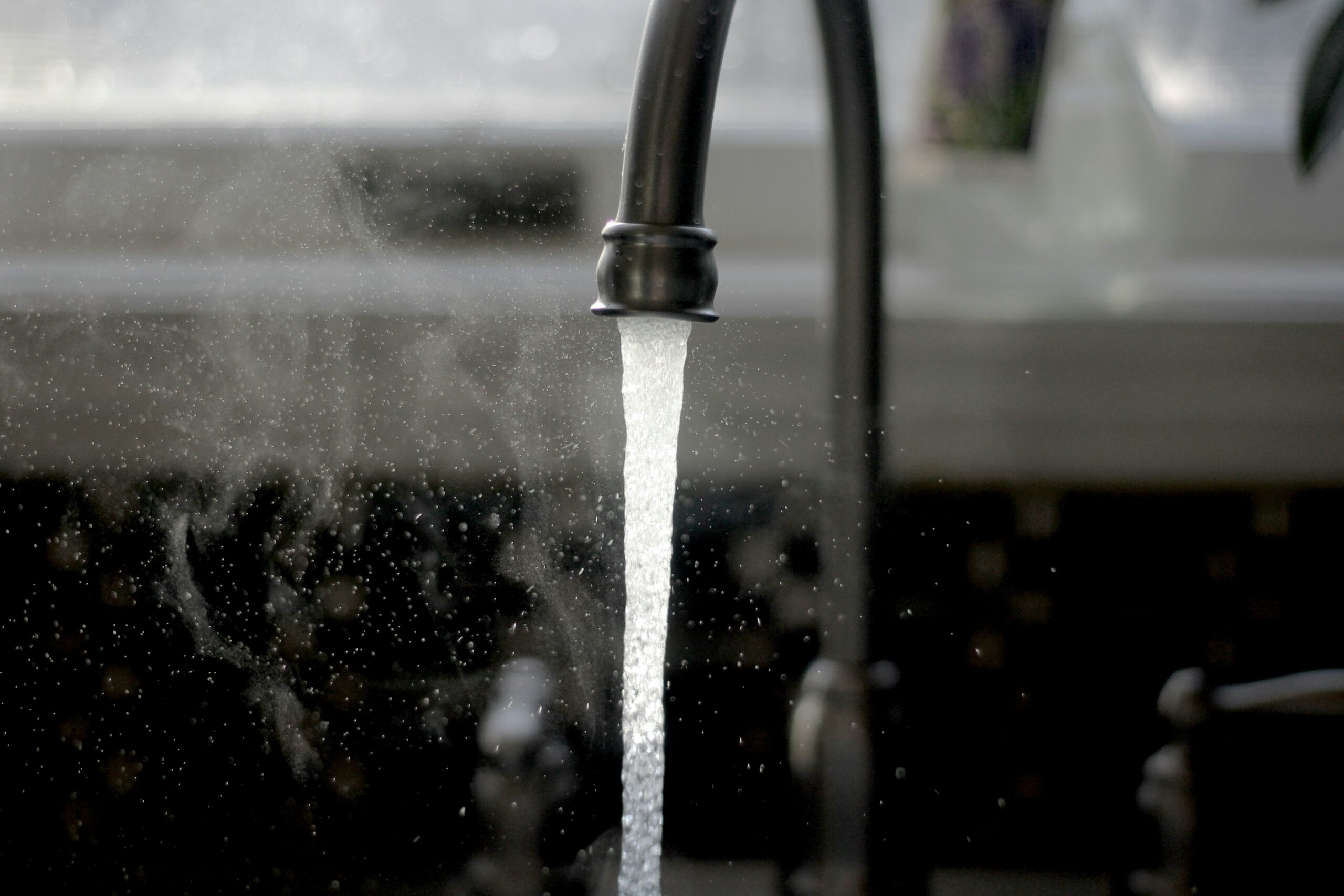Image description: water pouring out of a tap, with spray visible. Photo by Imani on Unsplash.
The drinking water watchdog for England and Wales has ordered companies to act after “forever chemicals” linked to cancer and other conditions were found in untreated water sources at levels it said “could constitute a potential danger to human health”.
A BBC analysis has examined 23 enforcement notices issued by the Drinking Water Inspectorate over elevated levels of PFAS which could “constitute a potential danger to human health” – revealing they affect the drinking water sources for more than six million people.
Watershed Investigations, a group of environmental journalists originally highlighted the enforcement documents.
Which water companies have been served notices?
In the last four years, 1.7 million tests for individual forever chemicals have been carried out across the network. At least 9,432 of those recorded PFAS levels above the level which the DWI says could constitute a potential danger to human health.
When a test result is above or likely to breach this level – set at 0.01ug/L – (micrograms per litre) the Drinking Water Inspectorate issues enforcement notices to the water company requiring action to be taken to ensure water is safe.
The analysis reported that water companies who have been ordered to improve their assets because of Pfas contamination include Anglian Water, where untreated supplies serving 4.2 million people are affected, and Wessex Water, serving 1.2 million. Severn Trent Water, South Staffordshire Water and South West Water, who serve hundreds of thousands of customers, have also been told to act. Affinity Water has five waterworks at risk and United Utilities has two, but the number of people whose supplies may be affected by these could not be determined.
The health implications
While the study of PFAS is a nascent field, a small number of these chemicals have been identified as carrying significant risks to human health.
Earlier this year the World Health Organization raised significant concerns about two specific compounds. It classified PFOA as carcinogenic, and PFOS as possibly carcinogenic -increasing the risk of thyroid, testicular and kidney cancers. Both substances are now banned.
The BBC assessed more than 2,000 individual test results from 2024, obtained via Freedom of Information Act requests, to identify which specific PFAS compounds were being found when levels breached the limits. This showed that both PFOS and PFOA were found in more than 350 of the drinking water tests.
How PFAS have entered drinking water
For decades forever chemicals have been applied to a wide range of uses in thousands of products from frying pans to medical equipment to school uniforms.
They have seeped into the environment over time, including the water that gets treated for drinking, through the washing of PFAS products, storm runoff and releases from industrial sites. An Environment Agency report estimated up to 10,000 potential hotspots nationwide.
Is drinking water in the UK safe?
Prof Hans Peter Arp, a Pfas expert, said the UK’s contamination problem was “large but by no means unique,” noting that “Pfas has seeped into drinking water supply zones around the world for over 50 years”. He explained that drinking water limits were only introduced about 25 years ago, initially covering just a few compounds like PFOA and PFOS, and are “not protective enough”.
The DWI told the BBC that it “operates one of the world’s most comprehensive PFAS monitoring programmes”, ensuring the public can have “complete confidence in the safety of their drinking water”.
However, the BBC also reported environmental charities and the Royal Society of Chemistry have raised concerns that UK guidelines are not legally binding and that the limits, which are 2.5 times higher than those of the US, should be reduced. The BBC understands that the government is currently preparing a white paper in response to the review which will include changes to the Drinking Water Inspectorate.
Turning off the tap on PFAS
The Environment Agency has said removing PFAS is very challenging for water companies with conventional water treatment infrastructure. Using newer technologies such as nanofiltration come with high costs and huge energy demands according to Prof Peter Jarvis, professor of water science and technology at Cranfield University.
Water UK told the BBC that: “Regardless of where you are in the country, when you turn on your tap, you are enjoying the very best drinking water in the world”.
But speaking to the Today programme, CEO David Henderson said that in light of the rising treatment costs the chemicals should be banned. The cost of cleaning up Pfas has been estimated at £1.6tn across the UK and Europe over a 20-year period, an annual bill of £84bn.
In addition to the comment from Water UK, a spokesperson from South West Water said that the five notices against it were “precautionary” and that it was “investing £42 million over the next five years to upgrade the water supply system.”
